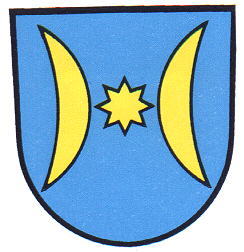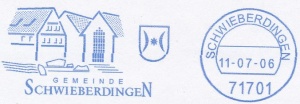Schwieberdingen: Difference between revisions
Knorrepoes (talk | contribs) m (Text replacement - "/Arms of " to "/Arms (crest) of ") |
Knorrepoes (talk | contribs) m (Text replacement - "↵↵'''" to "'''") Tags: Mobile edit Mobile web edit |
||
| (6 intermediate revisions by the same user not shown) | |||
| Line 1: | Line 1: | ||
'''SCHWIEBERDINGEN''' | '''SCHWIEBERDINGEN''' | ||
| Line 15: | Line 13: | ||
|- | |- | ||
|'''English''' | |'''English''' | ||
| | | blazon wanted | ||
|} | |} | ||
| Line 24: | Line 22: | ||
{|align="center" | {|align="center" | ||
|align="center"|[[File:{{PAGENAME}}p.jpg|center|300 px|Wappen von {{PAGENAME}}]] <br/>Postal cancellation 2006 | |align="center"|[[File:{{PAGENAME}}p.jpg|center|300 px|Wappen von {{PAGENAME}}/Coat of arms (crest) of {{PAGENAME}}]] <br/>Postal cancellation 2006 | ||
|} | |} | ||
{{de}} | |||
{{media}} | {{media}} | ||
Latest revision as of 14:53, 7 January 2024
SCHWIEBERDINGEN
State : Baden-Württemberg
District (Kreis) : Ludwigsburg
| German | In Blau ein achtstrahliger goldener Stern zwischen zwei abgewendeten goldenen Monden. |
| English | blazon wanted |
Origin/meaning
The arms are known from the local seal from 1800. An older seal, from 1597 showed a so-called wolf's hook. The figures are most likely derived from the arms of the Lords of Magenheim, who had many possessions in the village until 1321. They can also be derived from the older seal, where the wolf's hook was no longer recognised.
Another explanation refers to the crescents as ladles that were used in connection with dying clothes in old times. They were taken to scoop urine (that was needed as a colour fixation) and also the people of Schwieberdingen were called "Urine-Scoopers".
| Postal cancellation 2006 |
This page is part of the German heraldry portal Deutsche Wappensammlung |
Heraldry of the World |
|
German heraldry:
|
Selected collector's items from Germany:
|
Contact and Support
Partners:
Your logo here ?
Contact us
© since 1995, Heraldry of the World, Ralf Hartemink 
Index of the site
Literature: Bardua, 1987; last explanation provided by Shania from Schwieberdingen.













